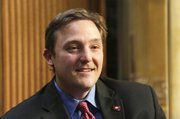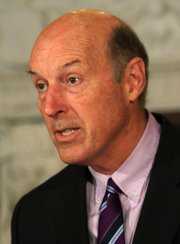An architect of former Massachusetts Gov. Mitt Romney's health care expansion -- which served as the template for President Barack Obama's Affordable Care Act -- will start work as the director of the Arkansas Department of Human Services on March 1, Gov. Asa Hutchinson said Wednesday.
Cindy Gillespie, a former health care adviser to the former Republican governor and 2012 presidential nominee, is a principal in Dentons' Public Policy and Regulation practice, Hutchinson said in a written statement.
Gillespie will be paid $280,000 a year -- up from the $162,147 salary paid to departing department Director John Selig -- and Hutchinson plans to seek the Arkansas Legislature's approval for the larger salary, Hutchinson spokesman J.R. Davis said.
Hutchinson believes that the salary increase for the department director is needed to hire the best candidate to manage state government's largest agency, Davis said.
The agency has an $8.3 billion budget and more than 7,000 employees.
The department includes aging and adult services; behavioral health services; child care and early-childhood education; children and family services; community service and nonprofit support; county operations; developmental disabilities services; medical services; services for the blind; and youth services.
Hutchinson, in a written statement, said he's confident that Gillespie "has the breadth of experience, management capabilities and the right ideas to lead Arkansas' largest agency," after his administration conducted a national search and interviewed a number of top candidates.
"She has nationally recognized expertise in the reform of Medicaid and she has extensive experience in managing complex programs," he said in his statement. "Most importantly, she has the heart and passion that is needed for an agency which is on the frontline of critical services that make a difference in the lives of Arkansans every day."
Gillespie said in a written statement issued by the governor's office that she's looking "forward to working with the highly-dedicated and capable employees at the state Department of Human Services, along with our partners throughout the state, to promote the health and well-being of all Arkansans, especially those most in need."
Davis said neither Gillespie nor Hutchinson would be available to answer questions Wednesday. When reached by phone at her office in Washington, D.C., Gillespie declined an interview. The Dentons' firm offers consulting services to companies regarding public policy and regulation.
The maximum authorized salary for the department director's job is $162,647 a year, said Jake Bleed, a spokesman for the state Department of Finance and Administration.
The governor plans to have a sole-source contract with Gillespie at the same pay rate as her annual $280,000 salary until the Legislature makes the necessary changes to approve the higher salary, Davis said.
The Legislature will meet in a fiscal session starting April 13, and Hutchinson has said he plans to call the Legislature in special session in early April to consider changes to the state's private-option program, which uses federal Medicaid funds to purchase private health insurance for some low-income Arkansans.
With a $280,000 annual salary, Gillespie would be the highest-paid state agency director.
But her salary would be exceeded by numerous employees at the state's higher-education institutions, including football and basketball coaches, chancellors and presidents. The highest-paid state employee is University of Arkansas' head football coach, Bret Bielema, whose compensation is $4 million a year.
House Speaker Jeremy Gillam, R-Judsonia, said Wednesday night in an interview that he favors raising the department director's salary based on the skills that the state needs for the job and the job's responsibilities.
"We'll have to review [the salary]," he said. "My personal feeling is we will have to look at an increase, whether it is that amount or another amount, I am not sure yet."
Kelley Linck, R-Yellville, the House Public Health Welfare and Labor Committee chairman, said human services directors turn over at a rapid rate across all states.
"If the [Legislature] is requested to approve higher pay, I trust a recommendation for that [pay] would include statistics to help us justify such a decision. We were fortunate to have the longevity of Selig, which certainly did lend to his expertise on the issues," Linck said.
Selig's tenure as the director for the Department of Human Services will conclude at the end of this month.
Selig praised the governor's choice.
"The governor has picked a very capable person, with a great deal of experience both in government and with health care," he said. "I think she'll be a real asset to this agency and the state."
Selig announced in the fall that he would leave because "it just seemed a good time" to seek a private-sector job after serving in the post since July 2005.
He has been a key player in the development of the private-option program that since 2013 has used federal Medicaid funds to purchase private health insurance for more than 200,000 low-income Arkansans. He's drawn both praise and criticism in that role.
Hutchinson wants the Legislature to overhaul the private option and rename it Arkansas Works. The governor met with federal officials Monday in Washington, D.C., about the changes that he would like to make to the private option.
Approved by the state Legislature and federal officials in 2013, the private option took effect in 2014.
The expansion extended coverage to adults with incomes of up to 138 percent of the federal poverty level: $16,243 for an individual, for instance, or $33,465 for a family of four.
Almost 250,000 Arkansans had been approved for coverage under the program as of Nov. 30. That included about 199,000 people who were in private-option plans and more than 22,000 others who were being covered by the traditional, fee-for-service Medicaid program because their health needs are considered exceptional.
Thousands of others had been approved for coverage but had not yet completed enrollment.
The changes Hutchinson is proposing include providing subsidized coverage through employer plans to enrollees with job-based coverage, charging premiums to enrollees with incomes above the poverty level, requiring referrals to job-training programs for unemployed enrollees and curtailing coverage or charging more in premiums for enrollees with substantial assets.
The state will have to begin paying 5 percent of the cost of the program in 2017, and the state's share will gradually increase to 10 percent by 2020.
Gillam, the House speaker, said Hutchinson has made "a great hire. Her resume is very accomplished, and I think she brings a lot to the equation."
Asked about Gillespie's role in Massachusetts' health care expansion -- which served as a blueprint for the Patient Protection and Affordable Care Act promoted by Obama -- Gillam said her experience is needed.
"From my standpoint, the experience of just setting up a unique structure to deliver health care is most important," he said.
Senate President Pro Tempore Jonathan Dismang, R-Searcy, who was one of three legislative architects of the private option, said Hutchinson conducted a through job search and hired a very qualified person as the department's director.
Dismang said he looks forward to working with Gillespie as the state develops solutions to the challenges its Medicaid system faces.
When Gillespie starts, she will face numerous challenges.
Among other things, longtime Children and Family Services Division Director Cecile Blucker is stepping down at the end of March.
Blucker has drawn criticism from lawmakers and others who believe that the division is beset by dysfunction and bureaucracy.
Blucker has said the division needs more caseworkers and more foster families to do its job effectively. The division's staff members juggle twice the caseload of their out-of-state peers and transport children across the state when foster homes aren't available.
The division, one of the agencies within the state Department of Human Services, is responsible for intervention in and prevention of cases of child abuse and neglect. It also oversees foster families and adoptions.
A Section on 02/04/2016


